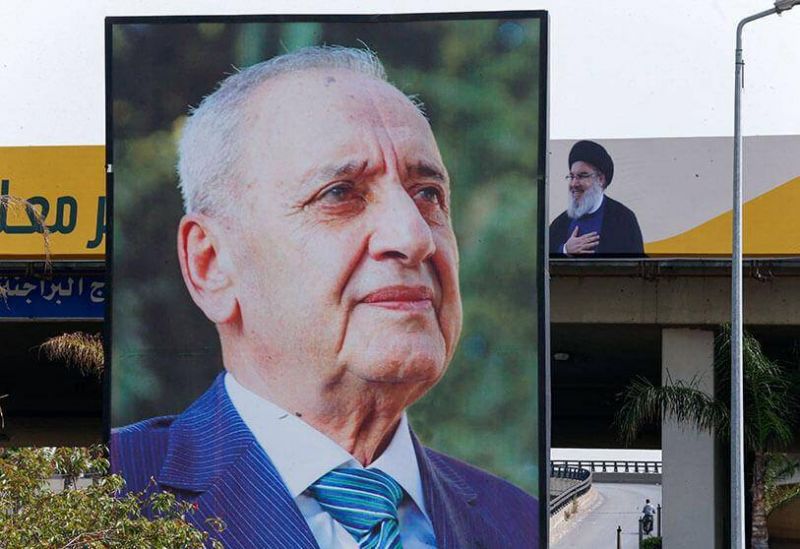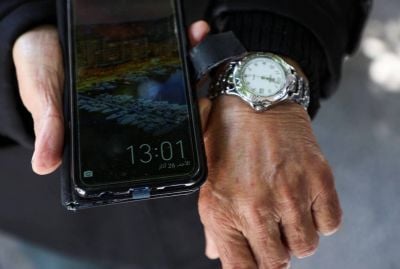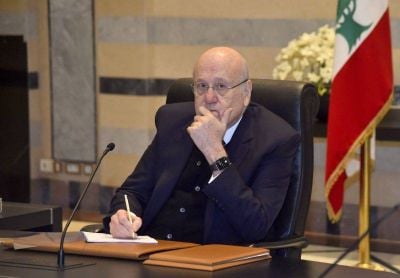
Election posters of Nabih Berri and Hassan Nasrallah in May 2022, in Beirut. (Credit: Louai Bechara/AFP)
There is a noticeable silence in Haret Hreik.
While sectarian squabbling simmered this past weekend over daylight savings time, Hezbollah remained silent, even refraining from defending its allies.
The episode ended with the victory of the “Christian” actors, both political and religious, who forced caretaker Prime Minister Najib Mikati to back down and switch to daylight savings time before the end of the month of Ramadan.
The defeated parties were Mikati — who holds office in the Grand Serail with the blessing of Amal and Hezbollah — and Parliament Speaker Nabih Berri, who was clearly behind this unusual decision.
All the while, Hezbollah appeared simply to watch from the sidelines while its closest ally lost another round of the political game. Is this stance part of Hezbollah’s classic approach, or has its alliance with Berri’s Amal Movement become too cumbersome?
A difficult partnership
This is not the first time that the majority-Christian parties, including Hezbollah’s ally the Free Patriotic Movement (FPM), have given Berri a hard time.
Already in June, the FPM joined its Lebanese Forces (LF) rivals and opposition MPs in refusing to vote for Berri as Parliament speaker — which saw him reap the lowest number of votes since he first took on the job in 1992.
This was enough to suggest Berri has a difficult path ahead. The Christian parties also torpedoed the speaker’s efforts to invite MPs to a dialogue session to break the country’s presidential deadlock and refused to attend any legislative session until a president is elected. That is not to mention their common desire to block the accession of Marada Movement leader Sleiman Frangieh, Hezbollah and Amal’s candidate to occupy the presidential palace.
The latest blow to the Parliament speaker was the episode of maintaining standard time and the leaked video of the meeting during which Berri apparently dictated his will to the caretaker prime minister. Here too, his opponents took it up a notch, forcing Mikati and Berri to back down from their decision while Hezbollah remained aloof.
“We made the decision to stay out of this because we did not want to exacerbate sectarian tensions,” Mohammad Afif Nabulsi, a Hezbollah spokesperson, told L’Orient-Le Jour.
While it is true that Hezbollah usually avoids commenting on controversial issues, some people on the scene say that the party was particularly embarrassed by the way this decision was made.
“Hezbollah believes that all this controversy has no meaning and opposes both the way Najib Mikati and Nabih Berri made the decision and the sickening sectarian reaction of some Christian parties,” a source close to Hassan Nasrallah’s party told L’Orient-Le Jour on condition of anonymity.
The video of the informal exchange between Mikati and Berri, appeared to show Mikati being intimidated by Berri’s insistence, before giving in and accepting to delay the shift to daylight savings time. It tore through social media. Mikati faced criticism for apparently yielding to the Parliament speaker’s will, and the latter was criticized for his willingness to impose himself as the only boss in the absence of a head of state.
“The alliance between Hezbollah and the Amal movement has never been easy,” said Nicholas Blanford, a researcher on Hezbollah with the Atlantic Council. “This is partly the result of the internal conflict between the two parties in the past, which explains the bitterness at times.”
In November 1990, the so-called Damascus Agreement ended nearly three years of fighting and tension between the two Shiite-majority parties. They had been at each other’s throats over hegemony and competition between Syria, Amal’s sponsor, and Iran, Hezbollah’s mentor.
Since then, the two parties share a handful of interests and follow one motto: avoiding a new bloodbath. But to this day, Hezbollah’s popular base does not always look favorably on Parliament’s strongman and have even accused him of corruption and mismanagement.
“Building the state does not happen through arbitrary decisions,” said the source close to Hezbollah. This does not mean that Hezbollah is ready to question ties with the speaker, who plays the role of an institutional showcase for the relationship.
“Hezbollah needs Nabih Berri,” said Blanford.
“Hezbollah’s relationship with the Amal movement is strong and strategic,” added Kassem Kassir, a political analyst well-informed about Hezbollah. Despite the crises the speaker faces, Kassir said, Berri “still has an influential role.”
Taking it easy on the FPM
Hezbollah’s strong relationship with Berri is one of the main reasons behind its deteriorating ties with the FPM.
Hezbollah has in fact sided with Mikati in his institutional tug-of-war with FPM leader Gebran Bassil. It also supports the election of Frangieh as president. Hezbollah’s Secretary General Hassan Nasrallah had to acknowledge this support loud and clear at the instigation of Berri, which angered the FPM.
As a result, the Mar Mikhael Agreement is currently a political zombie, as the FPM is not ready to forgive Hezbollah for its stance. The latter must therefore try to take it easy on the FPM, which offers the party valuable Christian legitimacy — this dynamic could have dissuaded it from openly supporting Berri in the controversy over the shift to daylight savings time.
On the other hand, some analysts believe that Hezbollah implicitly supports Berri and is happy with the sectarian outbidding that is agitating the country.
“Yes, Berri suffered a series of defeats in recent months,” analyst Sami Nader, director of the Levant Institute for Strategic Affairs, told L’Orient-Le Jour. “In fact, since the beginning of the crisis, the whole political system has been in a difficult situation. In these cases, the traditional parties resort to sectarian rhetoric to mobilize the masses in their favor.”
According to Nader, Hezbollah delegates to Berri the task of stirring up sectarian fervor in Lebanon, especially to distract public opinion from thorny issues such as Hezbollah disarmament and to dissuade its base in the Shiite community from embracing an interfaith discourse.
The fact remains that Hezbollah is also likely to lose some prestige as a result of the latest controversy. Indeed, the rare unified position of the rival LF and FPM has served as a show of strength — perhaps it could dissuade Hezbollah and Amal from trying to impose its candidate in Baabda without the cover of at least one of the two major Christian blocs.
As Berri is weakened on the local scene, Frangieh’s candidacy is also weakened, and the majority-Christian parties are aware of this. “We cannot say that this controversy has determined the fate of Frangieh or that it has been a defeat for Nabih Berri. It is too early to tell,” said Nabulsi, the Hezbollah spokesperson.
This article was originally published in French in L'Orient-Le Jour. Translation by Joelle El Khoury.

